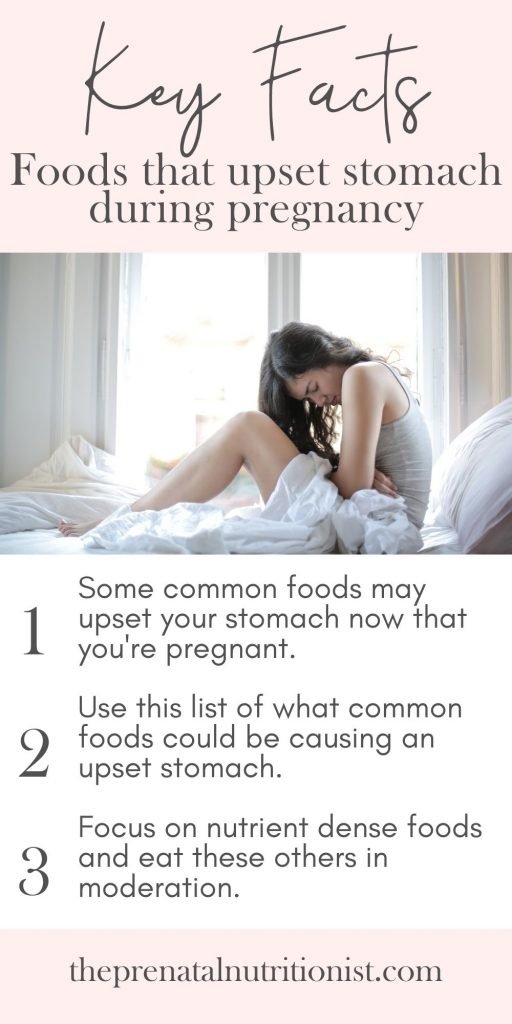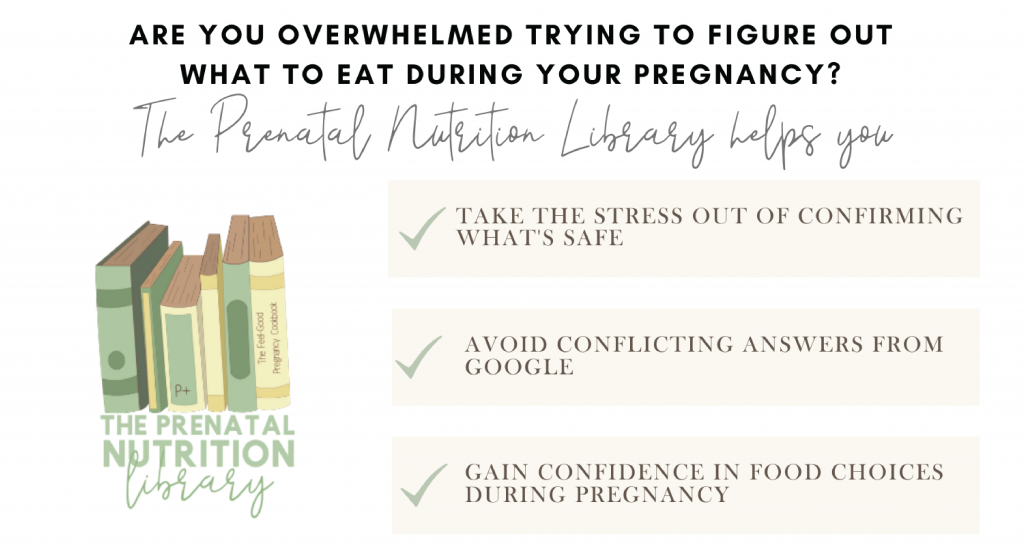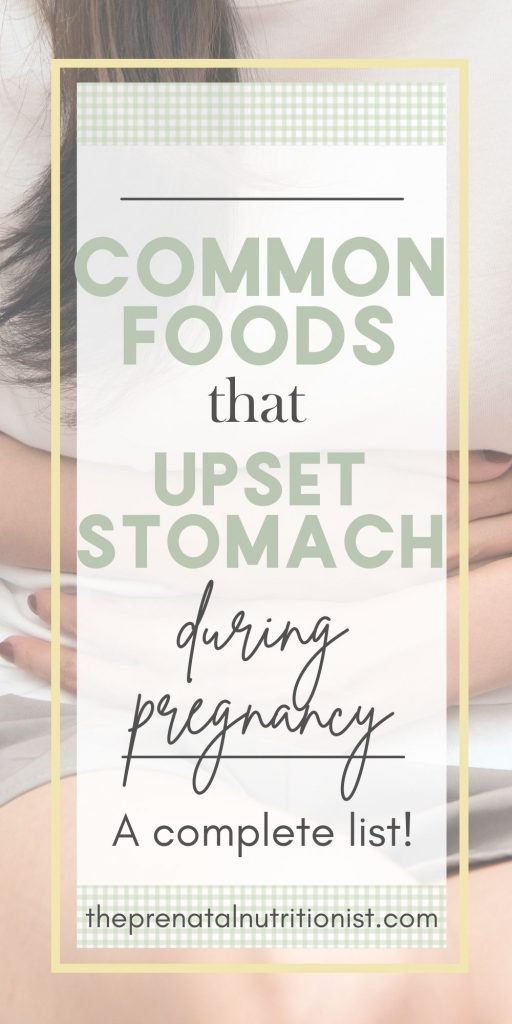
It’s no news that many women experience morning sickness and stomach discomfort throughout pregnancy. These symptoms are super common no matter what stage in pregnancy because so much is going on in a pregnant woman’s body. For example, a pregnant woman’s growing uterus and a sudden change in hormones can easily contribute to an upset stomach. Plus, your typical diet may not sound appealing anymore.
Unfortunately, some foods are more likely to cause an upset stomach during pregnancy and you can likely guess some of them. You may be reading this blog because you are experiencing unpleasant things like heartburn and acid reflux. One thing is sure, it is best to find your trigger foods because these can be different for everyone.
I’m sure you are aware that it’s important to eat food that fuels your body and supports your growing baby. Food is the most important part of meeting your nutrient needs during pregnancy, but you are also probably taking a prenatal vitamin. Some foods may be the ones hijacking your efforts to eat a full meal and keep up with your vitamins.
So, today we are going to talk about which common foods can upset your stomach during pregnancy! Keep reading this post to know those common foods that cause stomach aches and morning sickness.
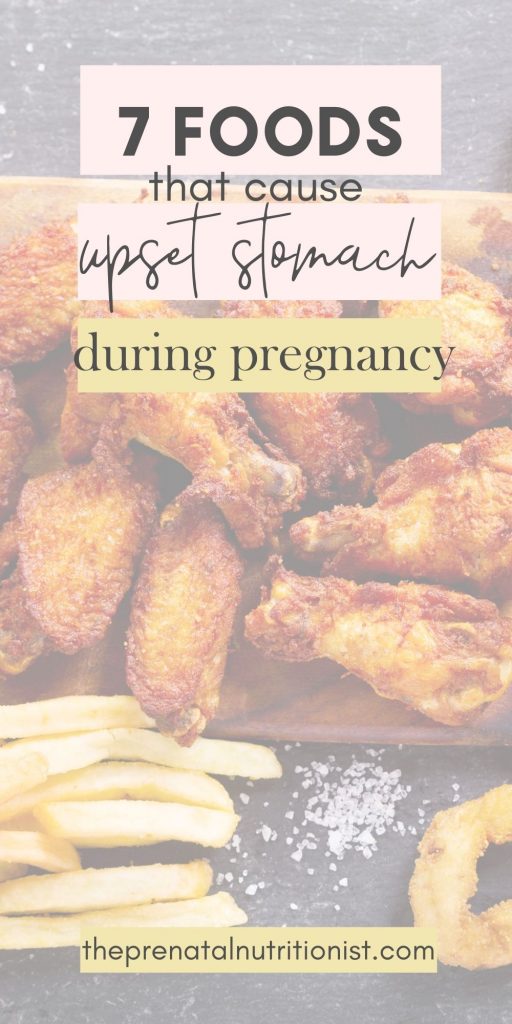
Common Foods That Upset Stomach During Pregnancy
Fried Foods
Everyone knows greasy foods aren’t the picture of perfect health. Call a friend, call your doctor, you already know the answer. Eat too much fried food and you’re probably going to have a stomachache! The extra oil used to fry the food is likely slowing down your digestion and causing you to feel bad. Fried foods are not great for your digestive track overall, but of course, can be enjoyed on special occasions. Greasy foods can also affect your gut bacteria and a healthy gut microbiome is a key to a healthy pregnancy. They’re higher in calories so something to also limit if you are struggling with weight gain.
Dairy Products
Now, this is only for you if you are allergic or sensitive to dairy. Dairy is a popular allergen food, so if this is the case for you, eating too much dairy can cause digestion issues, and stomach aches. If you aren’t allergic or sensitive, I recommend consuming dairy during pregnancy as it provides many important nutrients like iodine, calcium, vitamin D, protein, and probiotics. In fact, some people who are sensitive to dairy prior to pregnancy, have no issues with it during pregnancy or even crave a tall glass of milk! This is due to the high iodine content of which needs increase by 50% during pregnancy.
Spicy Foods
You either love or hate spicy foods; I don’t make the rules. If you don’t like them, then you probably have nothing to worry about, but if you eat spicy foods regularly, you might be prone to increased nausea and heartburn during pregnancy.
This is due to the way spicy foods contain capsaicin, a powerful ingredient that makes spicy food, well, spicy. Capsaicin can mess with your digestive system and can even cause diarrhea! We mentioned it earlier, but spicy foods also have a tendency to cause heartburn or irritate GERD. This is because your growing baby forces stomach acids higher into the esophagus which causes a burning sensation.
If you really love spicy foods though, they are safe to enjoy during pregnancy. And, if you are experiencing symptoms, try to eat smaller portions or use less spicy ingredients like hot sauces, peppers, etc. You can also try to pair your spicy food with ginger tea to help soothe your stomach.
Caffeine
Now, I’ve already covered why pregnant women should avoid drinking excessive amounts of coffee, so today I’m giving you one more reason to limit caffeine during pregnancy: it may upset your stomach. This popular drink has been linked with increased morning sickness and problematic acid reflux. So, it is best to avoid drinking high amounts of coffee or other caffeine-heavy drinks! If you’re wondering what are some safe alternatives, head over to THIS post.
Pungent Foods
Pungent foods, ones with a strong smell or taste, and pregnancy morning sickness don’t mix well, and you may have learned this the hard way. Just the strong smell might be enough to make you nauseous. If you need to stay out of the kitchen to avoid nausea and vomiting, I recommend it. Some very pungent foods like onions, garlic, mustard, or cayenne may even irritate the digestive tract, and cause you to have an upset stomach. So, if these are potentially infecting you, just limit your weekly intake of these foods and you should be fine! Read more about pregnancy GI distress HERE.
Acidic Foods
Fruits and vegetables are always the best you can eat! Though, if you’re dealing with stomach issues, some highly acidic foods can be hurting your digestion. A few of the most acidic fruits are tomatoes, lemons, oranges, and grapefruit. Their high acidic content can irritate the stomach lining and upset your digestion in the process. Especially mixed with pregnancy hormones and a growing uterus!
Artificial Sugars and Sugary Foods
Again, you probably already know that foods high in added sugar should be enjoyed in moderation during pregnancy. Still, it’s unbelievable how many hidden sources of sugar are out there! It’s easy to eat more sugar than recommended without intending to during pregnancy.
Overdoing it on the sugar can contribute to having an upset stomach and even increase nausea. When we limited protein foods, and instead rely on foods high in sugar, our blood sugar spikes and crashes often which leads to feeling nauseous. I’m sure you can also remember a time when you had too much cake or candy on a holiday and ended the day with some stomach pains. Of course, as mentioned above, sweet treats are okay in moderation, but ensuring proper protein throughout your day is key.
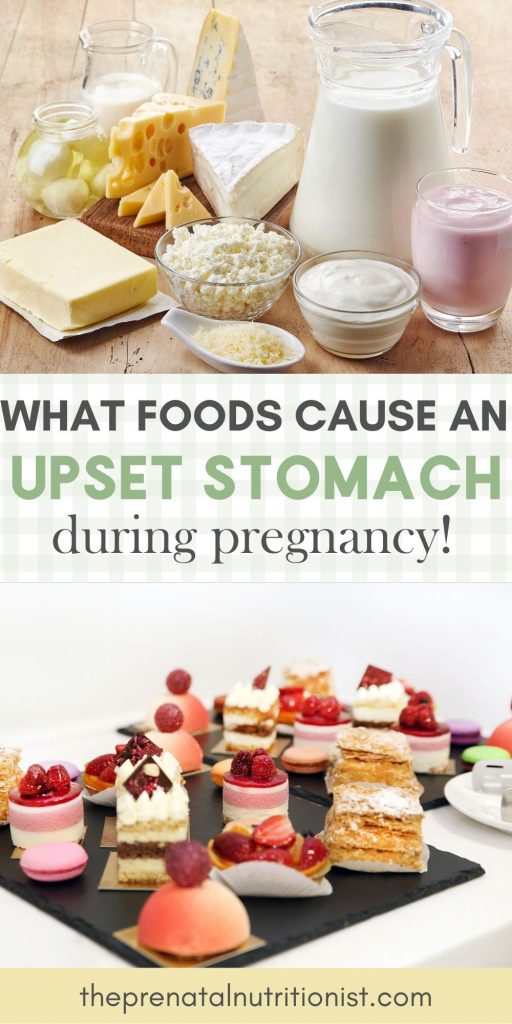
Common Foods That Upset Stomach During Pregnancy
What foods are a huge no-no for your stomach during pregnancy?
So, those are some foods that can upset your stomach or increase your nausea during pregnancy! As stated previously, even though these foods can mess with your digestion, you can still enjoy them in moderation. Just make sure to consume them in small doses or on special occasions depending on how it makes you feel.
Remember, if you feel any discomfort that doesn’t seem related to common pregnancy symptoms, talking to your doctor is the best choice. If you find yourself unable to eat coupled with vomiting, you may need medication and that is completely okay. Whatever it could be, checking in with a healthcare professional is the safest option.
Additionally, be sure to head over to The Prenatal Nutrition Library, an online hub of all things prenatal nutrition, for more evidence-based nutrition recommendations from a prenatal registered dietitian. There are tons more tips and recommendations on how to feel good and give baby the best start!
